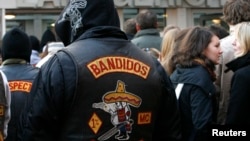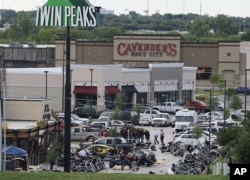Federal agents and local police officers surrounded a house in Conroe, Texas, north of Houston, Wednesday and arrested Jeffrey Fay Pike, the national president of the Bandidos Motorcycle Club. A federal indictment issued on December 16 in San Antonio, charges the 60-year-old and two other men of directing, approving and allowing violence against members of the rival Cossacks club.
Federal agents in San Antonio arrested the other two men, Bandidos Vice President John Xavier Portillo and National Sergeant at Arms Justin Cole Forster on similar charges. They also charged Forster with possession and intent to distribute methamphetamine.
A defense attorney’s view
Speaking to VOA after his client’s initial hearing, Pike’s attorney, Kent Schaffer, said the specific charges against the Bandidos leader are much more limited than the general charges outlined against all three in the indictment.
Schaffer said, “It does not really allege that Jeff Pike did anything other than that he was aware of the fact that Bandidos out in west Texas were fighting with Cossacks.”
Deliberately remaining ignorant of criminal activity being carried out by others is a crime, but Schaffer said it is usually accompanied by other charges. He also questioned the alleged urgency of stopping further Bandidos violence against Cossacks through an indictment issued on December 16 and not acted on until now.
Schaffer said, “You would think that if they were that concerned about the safety of the Cossacks that they would have either, one, indicted the case much sooner than they did or, secondly, at the time they returned an indictment they would have made the arrests.”
Waco biker shootout
Schaffer said federal authorities may have been motivated to act because of the shootout at a biker gathering in Waco, Texas in May that left nine people dead and around two dozen wounded. Pike was not there, having just had surgery that left him recuperating for a few months. During that time, Schaffer said, Portillo took control of executive duties for the club, which was founded in Houston in the 1960s and now has some 2,000 members in 15 countries.
But federal officials say the indictment is the result of a 23-month investigation that uncovered criminal activity on a broad spectrum, including plans to commit violent assaults and murders. The indictment refers to the Bandidos as “a highly organized criminal organization.” Both federal authorities and Texas law enforcement officials regard the Bandidos as a gang that flaunts the law and threatens society.
Special Agent Joseph M. Arabit, the head of the U.S. Drug Enforcement Administration’s Houston Field Division said the operation that led to the indictment "has inflicted a debilitating blow to the leadership hierarchy and violent perpetrators of the Bandidos Outlaw Motorcycle Gang.”
Gangs or clubs?
But Civil Rights organizations and legal experts alike have criticized the mass arrests by police and indictments brought by prosecutors in Waco, and some are maintaining wariness in regard to the federal indictment as well.
At Texas Tech University in Lubbock, Texas, history professor Randy McBee objects to police and the media using the word “gangs” in referring to “clubs” and he expresses concern that people may view all bikers as criminals because of crimes committed by a relative minority within the clubs.
“You take the average guy who rides a bike,” he said in a VOA interview, “and he is attracting the attention and the scrutiny of the police and the odd stare from the public just as much as these other guys are, just because he is on a bike.”
McBee, who owns a motorcycle and has written a book about biker culture, said biker clubs offer social solidarity for many people that is difficult to find anywhere else in American society today.
“There really is a sense of community,” he said. “Whenever I am on my bike and I see someone else on one there is an unspoken solidarity that exists. It is the basis of identity.”
McBee thinks it is possible, even in groups like the Bandidos, for some members to be involved in criminal activities while others belong only for the social bonding. Some law enforcement officials agree, but they say there is plenty of evidence to show that violence and illegal schemes have become the norm within at least some of the clubs and that, in their view, justifies their use of the word “gangs.”









